“I’ve got a bad case of the 3:00 am guilts – you know, when you lie in bed awake and replay all those things you didn’t do right? Because, as we all know, nothing solves insomnia like a nice warm glass of regret, depression, and self-loathing.” ― D.D. Barant, Dying Bites
I find myself awake most nights tossing and turning in my bed. I try to lie still and calm my mind but I only end up staring blankly at the ceiling. I get out of bed and look at the clock. It’s 2 am. I need to get up early and go to work. Yet I am unable to sleep. Again.
I feel every minute passing slower than the previous one. I can hear the clock ticking agonizingly. I feel myself getting more frustrated and desperate to get some good, deep, refreshing sleep. I am very tired. Exhausted. Yet I feel like I just woke up and had 3 cups of coffee. I lie motionless on my bed. It’s boring.
My mind is boggled with weird thoughts. I think about embarrassing memories that have no meaning now. I breathe deeply and try to relax. I am still wide awake. Again. This is what happens every night. If I am lucky, some nights I manage to get into a ‘sleep like state’ for around 2 hours before it’s time to get up and go to work. I feel like I have forgotten how to fall asleep. I ask myself, “Are these the symptoms of insomnia?”
“I want to sleep but my brain won’t stop talking to itself.” – Unknown
Related: Why Sleeping Is The Easiest (And Hardest) Part Of Living With Depression
Is this what you feel too?
If you find yourself staring at the ceiling in the middle of the night, like me, then most probably you’re an insomniac. Depending on how often you’re unable to sleep, your persistent sleeplessness can actually hint at a serious sleeping disorder. Insomnia affects millions of individuals across the world and the effects can be overwhelming.
According to a recent report by the National Sleep Foundation, around 40 percent of American adults suffer from insomnia. Moreover, almost 15 percent of U.S. adults have reported suffering from chronic insomnia. Today, insomnia is the most common sleep disorder in the United States.

What Is Insomnia?
“Insomnia is a gross feeder. It will nourish itself on any kind of thinking, including thinking about not thinking.” – Clifton Fadiman
It is a sleep disorder that affects your ability to get a good night’s sleep and affects your capacity to function during the day. An insomniac will find it hard to fall asleep or to stay asleep throughout the night. Moreover, later in the day, you will feel lethargic, exhausted, fatigued, have memory issues, and lack concentration. In the long run, insomnia can severely affect your physical and mental health. Some of the related symptoms of insomnia include anxiety, irritability, and mood swings.
Most of us experience sleepless nights due to work pressures, family responsibilities, and easy access to technology in the bedroom. However, when you are having sleeping problems for over 3 months and it is affecting your daily life, then you might have insomnia.
If you are an insomniac like I am, then here are some interesting facts you need to know about insomnia:
- Around 40 million people in the U.S. suffer from insomnia each year.
- It is more common in adult women than adult men.
- Insomnia is more common in older people than younger individuals.
- Emotional, psychological and medical issues can cause insomnia.
- It can be treated either through medicines or behavioral and lifestyle changes.
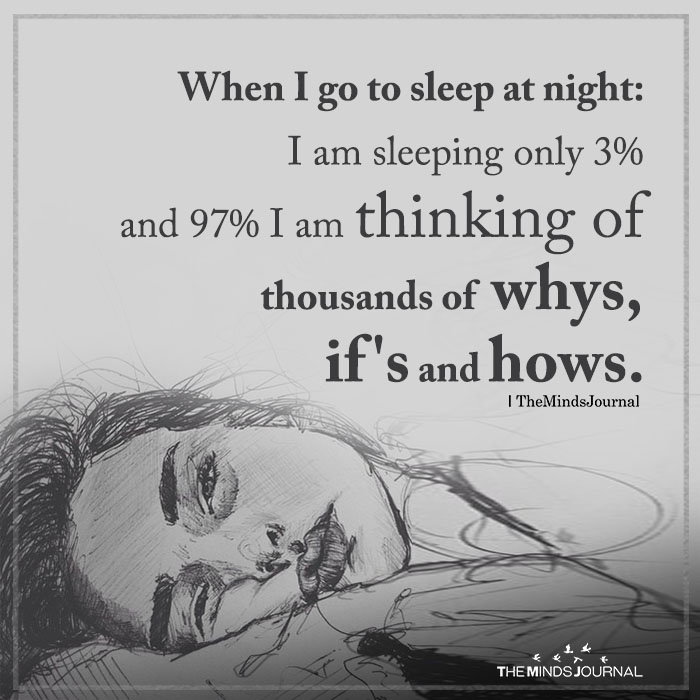
Why You Can’t Sleep
“Insomnia is an indication, not chaos. It’s like an ache. You’re not going to provide a patient with ache medicine without figuring out what’s reasoning the pain.” – Judith Owens
I have found that various physical, emotional, and psychological factors can cause insomnia in a person. Certain medical conditions can also lead to chronic insomnia while acute insomnia can be the result of recent unpleasant events or trauma.
Related: The Creative Power Of Your Sleep: 10 Easy Practices
Here are some of the most common causes of insomnia:
1. Circadian rhythm
You can experience insomnia when your circadian rhythm is disrupted due to changes in lifestyle or work timings, jet lag, environmental noise, extreme weather, or high altitudes.
2. Emotional and psychological conditions
Emotional and psychological factors like anxiety, stress, depression, grief, trauma, bipolar disorder, psychotic disorder, and others may result in insomnia.
3. Medical causes
Often underlying medical issues like tumors, brain lesions, arthritis, stroke, Parkinson’s disease, Alzheimer’s disease, hyperthyroidism, asthma, sleep apnea, acid-reflux disease (GERD), congestive heart failure, chronic fatigue syndrome, and many others may lead to insomnia.
4. Hormones
Changing hormone levels like estrogen or during menstruation or due to medicines can result in insomnia as well.
5. Other causes
There can be many other secondary causes like pregnancy, genetic conditions, parasites, an overactive mind, and a snoring partner can also be contributing factors.
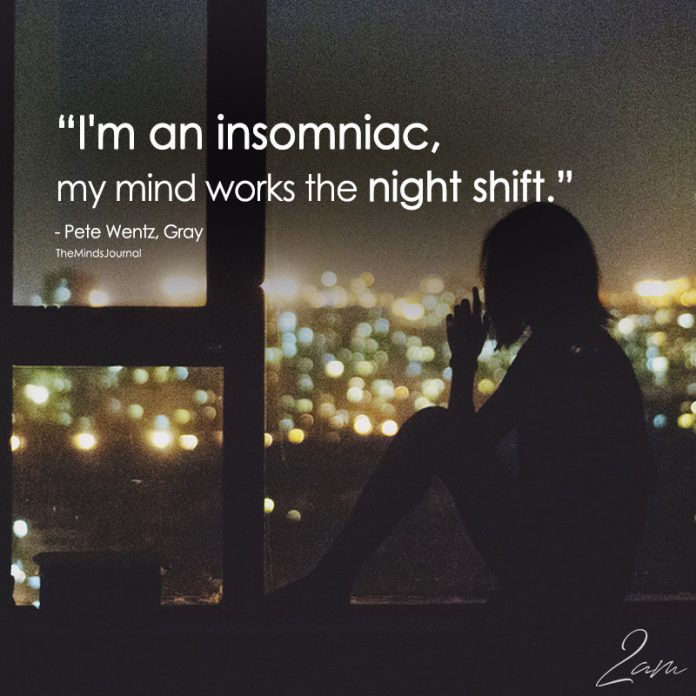
Are You An Insomniac?
“Sleeplessness is a desert without vegetation or inhabitants.” – Jessamyn West
In itself, insomnia can be a sign of a serious medical condition. Nonetheless, there are several signs and symptoms of insomnia that can help you identify if you are an insomniac:
- Having trouble sleeping at night
- Repeatedly waking up in the night
- Finding it hard to go back to sleep
- Waking up earlier in the morning than you wanted
- Feeling tired even after sleeping in the night
- Cognitive impairment
- Feeling sleepy and fatigued during daytime
- Feeling irritated, anxious and depressed
- Experiencing mood swings and behavioral issues
- Lack of focus and poor concentration
- Making too many errors, mistake and accidents
- Having severe headaches
- Gastrointestinal issues
- Thinking about sleeping all the time
- Having problem with socializing
Related: 7 Steps To Getting The Sleep Your Mind And Body Needs
How To Overcome Insomnia
“That’s the advantage of insomnia. People who go to be early always complain that the night is too short, but for those of us who stay up all night, it can feel as long as a lifetime. You get a lot done.” – Banana Yoshimoto
If insomnia is affecting your mental, emotional and physical health, then I would suggest that you start changing your lifestyle, behavior, and habits as it can help you beat insomnia without the need for taking any medication.
Here are 9 ways you can cope with insomnia effectively by making small changes in your life:
1. Sleep in a comfortable environment
Make sure your bedroom and your bed are comfortable enough for you to rest properly, mentally and physically. You should be able to control the noise, lighting, and temperature in your bedroom to make it favorable for a good night’s sleep.
2. Avoid stimulants and alcohol
Stay away from caffeine, nicotine, and alcohol. If you can’t eliminate them from your life completely, then make sure you drastically reduce consumption if you want to sleep better and live healthier. Caffeine and other stimulants can keep you up for almost 24 hours.
Moreover, alcohol can make you feel restless despite feeling like a sedative initially. If you are taking medicines like asthma inhalers or decongestants that can function like stimulants, then consult your doctor immediately.
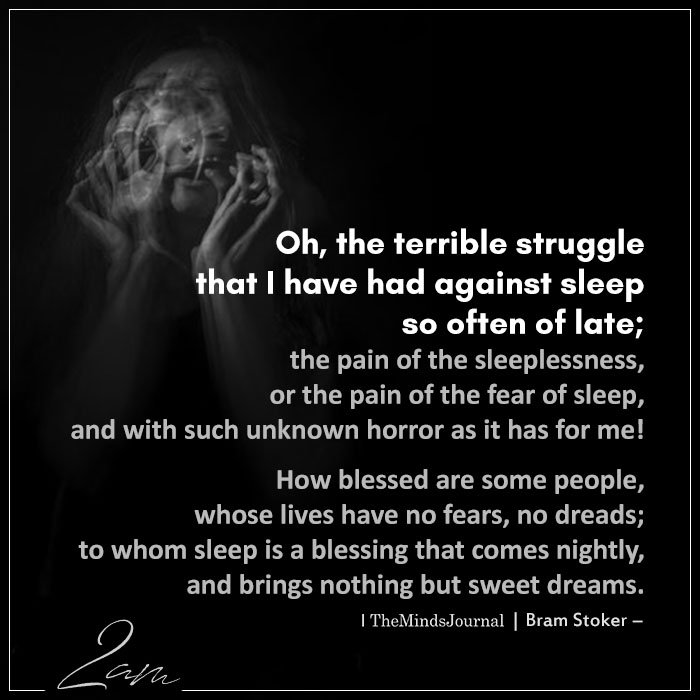
3. Stop stressing before bedtime
“If you can’t sleep, then get up and do something instead of lying there worrying. It’s the worry that gets you, not the lack of sleep.” – Dale Carnegie
Yes, we are all stressed… almost all the time. But you need to stop worrying and reduce your stress levels before going to bed. Reflect on your day and plan for the day ahead either before dinner or right after it so that you can avoid these things while lying on your bed. Listen to some soothing music or read a relaxing book before bedtime that will help you calm down and sleep better.
4. Restrict your naps
Although sleeping longer might seem like a logical solution for missing out on sleep, it can often lead to severe insomnia. Create and follow a strict sleep pattern regularly. Take efforts to train yourself to fall asleep by going to bed at a specific time every day, banning all devices in the bedroom, and relaxing in the darkness. Naps during the daytime can adversely affect the quality of your sleep at night.
Related: The 3 Most Popular Sleeping Positions And Their Health Impacts
5. Start exercising
“Physical activity within four hours of bedtime and illness can also cause this type of insomnia.” – Alistair Sinclair
Personally, exercising works wonders for me. I feel tired after a good workout and I get rather sleepy after having my dinner. So if you haven’t hit the treadmill in a while, this can be a great opportunity for you to get started or restarted.
Studies have shown that regular exercise can help to improve the duration and quality of sleep. However, I would suggest that you avoid working out immediately before going to bed as it can leave you feeling energized and restless. It is best to finish your exercise at least 3 hours before your bedtime.
6. Wake up at a specific time
Just because you’re unable to sleep or sleeping very late, doesn’t mean you will sleep late, especially on the weekends. However, waking up at the same time every day can help you train your body to follow a proper sleep schedule which in turn will help you fall asleep faster.
7. Avoid late night dinners
Eating or drinking immediately before sleeping can keep you awake as it activates your digestive system.
Whether you eat a heavy, late-night dinner or a light post-dinner snack, it can be detrimental to your sleeping goals. You also need to avoid drinking too many fluids before bed as it will put pressure on your bladder. This will keep you up and force you to visit the bathroom more than you’d want to.
8. Relax
“Sleep is such a luxury, which I can’t afford.” – Robin Sikarwar
There are several relaxation techniques and therapies that can help you to reduce stress, calm yourself & body and fall asleep faster. You can try meditation, deep breathing, imagery, or progressive muscle relaxation to relax your mind and body.
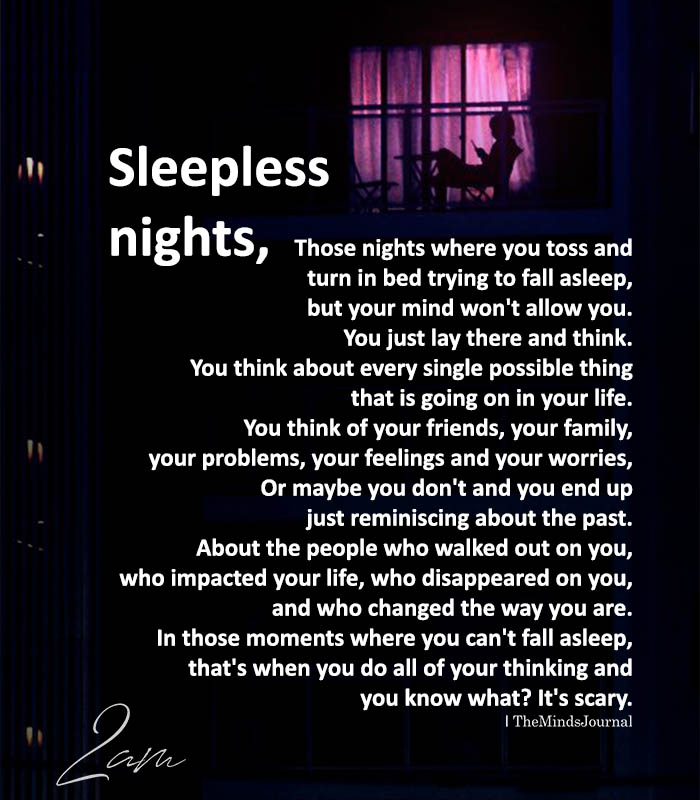
9. Try cognitive therapy
Cognitive therapy can help you a great deal in identifying the symptoms of insomnia and curing it. It can also help you cope with inappropriate feelings, beliefs, and thoughts that may cause insomnia. Moreover, you can learn a lot about practical sleeping goals, sleep changes related to age, and sleeping norms with the help of cognitive therapy. All this can empower you to overcome insomnia for good.
Mr. Sandman, Bring Me A Dream
“It is a special kind of homelessness to be evicted from your dreams.” – Karen Russell
It is not necessary for you to suffer through sleepless nights on a daily basis. There are a range of medical and non-medical treatments options available. Here I have listed some of the most effective non-medical strategies that can help you cure your insomnia. However, if your condition is severe and you are facing physical and mental issues, then I would suggest you seek professional help immediately.
The important thing is that you identify and take the necessary steps to treat your insomnia. So if you think you are an insomniac, then start working on beating it immediately. After all, why would you want to spend another sleepless night when you can call in the Sandman and sleep your way to dreamland.
Don’t let the bed bugs bite!
Frequently Asked Questions (FAQs)
How can I fall asleep with insomnia at midnight?
To sleep better with insomnia, have a quiet and relaxing bedtime routine by relaxing your body, creating a comfortable sleep environment and avoiding caffeine or alcohol before going to bed.
What is the link between anxiety depressive disorder and severe insomnia?
There are certain symptoms of anxiety depressive disorder that can make it harder for you to sleep. It results in anxiety-induced insomnia and can even make you apprehensive.
Ways to cope with insomnia that is caused by trauma?
Trauma can leave you feeling agitated and restless, which can make it difficult to sleep. So maintain your usual sleep schedule by keeping your room’s environment cool, dark, and quiet.
Can insomnia cause night terrors?
Insomnia or lack of sleep can trigger and induce feelings of dread while sleeping known as night terrors.
What are the natural remedies for insomnia in children?
Some of the natural remedies for insomniac children are, drinking warm beverages or applying essential oils before sleep. Parents can even help by establishing a bedtime routine, calming their feas, etc.
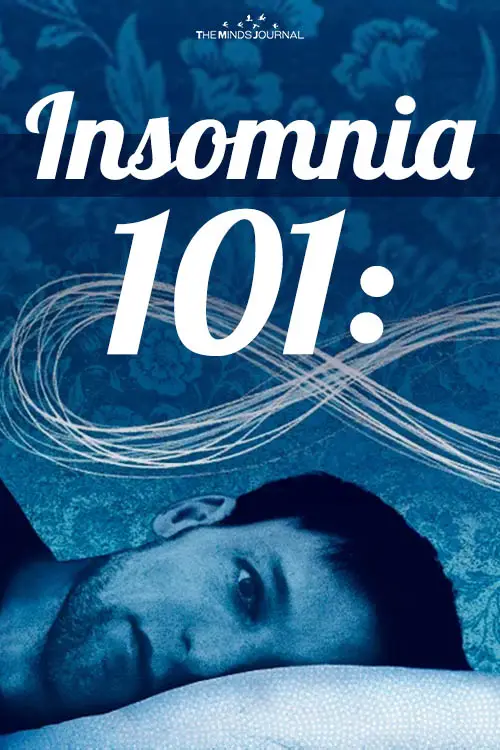
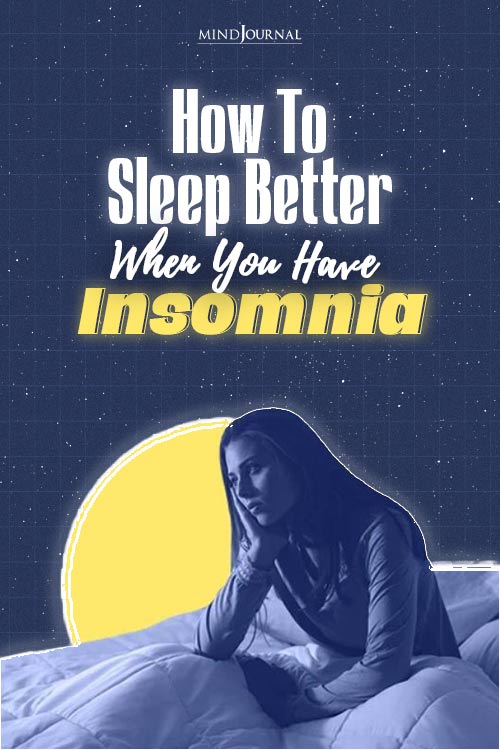
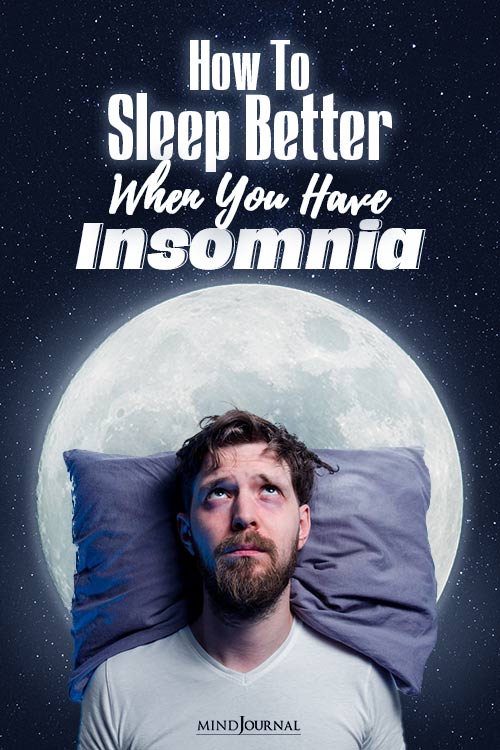
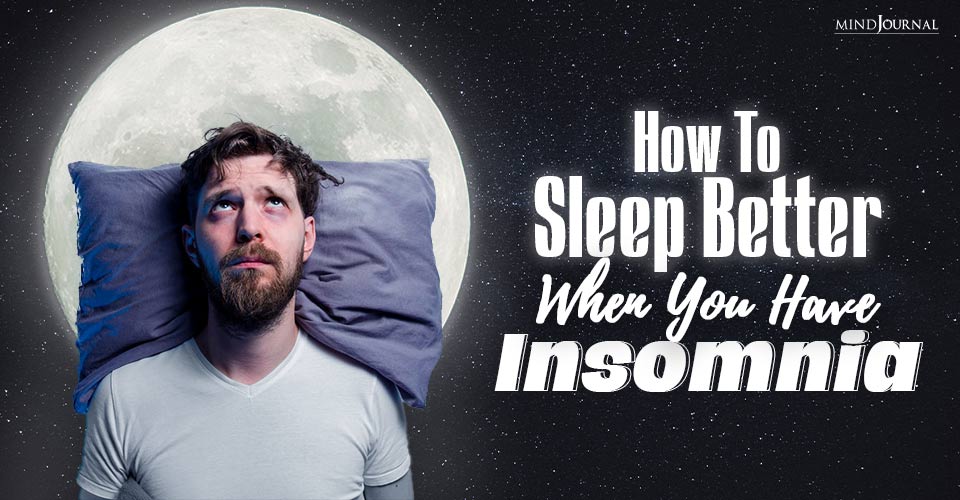







Leave a Reply
You must be logged in to post a comment.